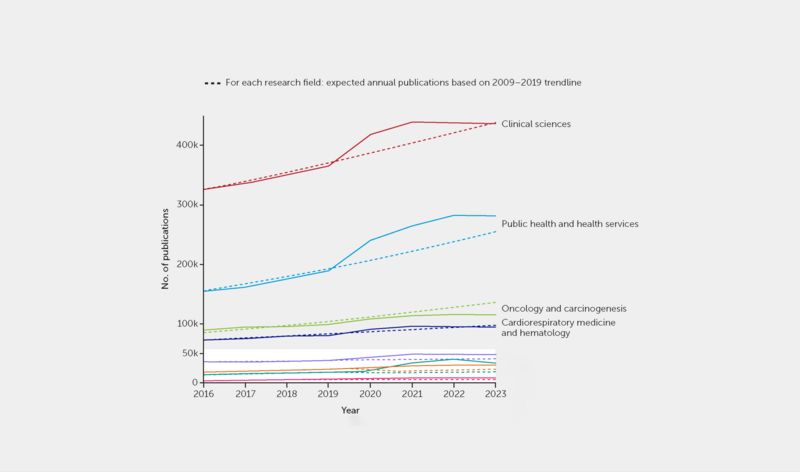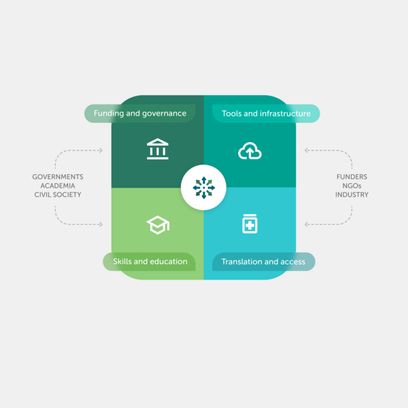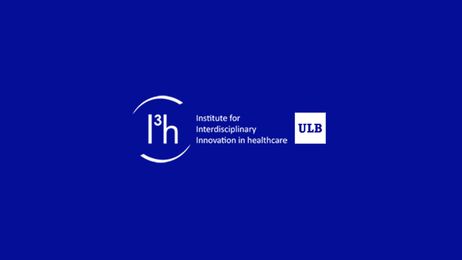
Frontiers in Science Lead Article
Published on 23 May 2024
Standing the test of COVID-19: charting the new frontiers of medicine
- 45,144 views
- 6 citations


Frontiers in Science Lead Article
Published on 23 May 2024

Experts discussed the future of medicine at a virtual Frontiers Forum Deep Dive session on 26 September 2024.

Exploiting the full potential of medical advances requires open science, innovative partnerships, and putting patients at the center of healthcare delivery, say Luca Perico and Giuseppe Remuzzi of the Istituto di Ricerche Farmacologiche Mario Negri IRCCS, Italy.

Four mission-critical dimensions must be addressed for equitable access to novel medical technologies, urge Olusoji Adeyi, Prashant Yadav, and Michel Kazatchkine of Resilient Health Systems, USA, INSEAD, France, and the Global Health Centre, Geneva Graduate Institute, Switzerland.

Collaboration between science, medicine, policymakers, and societies is essential for tackling major health emergencies and pandemics, highlights Brigitte Autran of Sorbonne Université and President of the French Committee for Monitoring and Anticipating Health Risks (COVARS).
The number of medical and health science articles published during the COVID-19 pandemic years 2020–2022 was 9% higher than trend-based predictions, reflecting accelerated research and technological progress across many areas of biomedical science.
Innovations unleashed by the pandemic for combatting communicable diseases—including in vaccine, monoclonal antibody, and antimicrobial development, in mathematical modeling, and in multisectoral, international collaboration—must be leveraged to further improve patient care and public health.
The pandemic underlined the importance of advancing personalized/precision medicine, taking individual, environmental, and social determinants of health into account; advanced omics-based technologies enabled by systems biology, advanced computational analytics, artificial intelligence (AI), and new clinical trial designs, offer unprecedented opportunities.
The pandemic accelerated digital medicine: telehealth and digital therapeutics are driving improvements both in clinical care and health systems resilience.
Achieving this future of medicine requires new forms interdisciplinarity that integrate knowledge and skills across biomedical science, healthcare, public health, regulation, policy, economics, social science, and more—supported by radical reform of research funding and policies to ensure equitable access to medical innovation across populations and countries.

A summary of the lead article in a Q&A format, with infographics and a video.

A version of the lead article written for—and peer reviewed by—kids aged 8-15 years.

The Covid-19 pandemic changed medicine forever—now scientists reveal a bold new vision for the healthcare of the future.

A team of scientists writing in Frontiers in Science lays out a bold vision for precision approaches to understanding, preventing, and treating diseases, driven by revolutionary technologies and new interdisciplinary collaborations between researchers and other health sector professionals.

In a recent review published in the journal Frontiers in Science, researchers underline the need for multidisciplinary collaboration in medicine, particularly in transmissible illnesses, precision/personalized medicine, systems medicine, and data science, based on the lessons learned from the coronavirus disease 2019 (COVID-19).

Scientific advances driven by the COVID pandemic have the potential to transform personalized medicine, say researchers, who outline steps to fully realize this potential.
Follow the science, follow Frontiers in Science